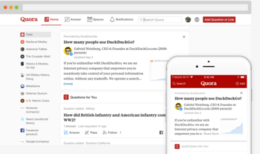Quora facts for kids
 |
|

Screenshot of homepage
|
|
| Type of business | Private |
|---|---|
|
Type of site
|
Question and answer |
| Available in | 24 languages |
| Founded | June 25, 2009 |
| Headquarters | Mountain View, California, United States |
| Area served | Worldwide |
| Founder(s) | Adam D'Angelo Charlie Cheever |
| Key people | Adam D'Angelo (CEO) Kelly Battles (CFO) |
| Revenue | US$20 million (2018) |
| Employees | 200–300 (2019) |
| Registration | Yes |
| Launched | June 21, 2010 |
| Current status | Active |
| Written in | Python, C++ |
Quora is a popular American website where people can ask and answer questions. It's like a huge online library of knowledge, but instead of books, it has answers from real people. Quora started on June 25, 2009, and became available to everyone on June 21, 2010. On Quora, you can post your own questions, answer questions from others, and comment on the answers. In 2020, about 300 million people visited the website every month!
Contents
How Quora Started
The Founders and the Name
Quora was created by two former Facebook employees, Adam D'Angelo and Charlie Cheever. They started the company in June 2009.
Charlie Cheever once explained how they picked the name "Quora." He said they spent hours thinking of ideas and writing them down. After talking to friends and removing names they didn't like, they chose Quora. Another name they considered was "Quiver."
Early Years and Growth (2010–2013)
Quora quickly became popular after it launched. People liked its easy-to-use design and the helpful answers from users, many of whom were experts. By the end of 2010, so many people were visiting Quora that the website sometimes had trouble handling all the traffic!
For a while, Quora didn't show ads. The founders believed that ads could make the website less enjoyable for users.
In June 2011, Quora changed its website design to make it easier to use. Adam D'Angelo said these changes were based on what worked well as the site grew. In September 2012, Charlie Cheever stepped down from his daily role but remained an advisor. Adam D'Angelo then took on more control of the company.
In January 2013, Quora added a blogging feature, allowing users to write longer articles that weren't just answers. They also made it possible to search for questions and answers on the website and on mobile phones. By May 2013, Quora's usage had tripled compared to the year before.
Growing More and New Features (2014–2017)
Quora became known as a more organized place for questions and answers, like a mix of Yahoo! Answers and Wikipedia. In April 2014, Quora received $80 million in funding to help it grow even more.
Adding Advertisements
In April 2016, Quora started showing a small number of ads on its site. The first company to advertise on Quora was Uber. Over time, more ads appeared, but they were still not as many as on other websites.
Expanding to More Languages
Quora wanted to reach more people around the world. In October 2016, they launched a Spanish version of the website. Then, in 2017, they added beta (test) versions in French, German, Italian, and Japanese. By April 2018, they had also launched beta versions in Hindi, Portuguese, and Indonesian. Quora later planned to add even more languages, including Bengali, Marathi, Tamil, Telugu, Finnish, Norwegian, Swedish, and Dutch.
Changes to Anonymity
In February 2017, Quora changed how people could ask or answer questions anonymously. Before, anonymous posts were linked to a user's account. After the change, anonymous questions and answers were completely separate from the user's main account. This meant users could no longer switch between anonymous and public answers easily.
Reaching More Users
By April 2017, Quora reported having 190 million unique visitors each month, which was a big jump from 100 million the year before.
More Growth and a Data Issue (2018–2019)
In September 2018, Quora announced it had 300 million unique visitors every month. However, many of these users might not have used the site regularly. Some might have created accounts without realizing it, or simply forgotten about them. Quora often uses pop-up messages to encourage visitors to log in or sign up to see more content.
In December 2018, Quora announced that about 100 million user accounts were affected by a data breach. This meant that some user information, like names, email addresses, and encrypted passwords, was accessed by unauthorized people. Quora's CEO, Adam D'Angelo, said that most of the information accessed was already public on the site, but that private account details being compromised was serious.
By May 2019, Quora was valued at $2 billion. Even with this high value, the company was still working to make a profit, as it showed very few ads compared to other similar websites.
In December 2019, Quora opened its first international engineering office in Vancouver, Canada. This office focuses on machine learning and other technical tasks. That same month, Quora also launched versions of its website in Arabic, Gujarati, Hebrew, Kannada, Malayalam, and Telugu.
Recent Developments (2020–Present)
In January 2020, Quora had to let go of some employees in its San Francisco Bay Area and New York offices due to financial reasons.
During the COVID-19 pandemic in June 2020, Adam D'Angelo announced that Quora would allow its employees to work from home permanently.
In April 2021, Quora changed its rule about using real names. Users no longer had to use their full real names and could use pseudonyms (made-up names) instead.
In August 2021, Quora started allowing users to earn money from their content. They also launched a subscription service called Quora+, where people pay a monthly or yearly fee to access special content that creators choose to put behind a paywall.
In November 2021, Quora removed the option to answer questions anonymously. They encouraged users who wanted to keep their identity private to create separate accounts using pseudonyms instead. This change was made to reduce answers that broke Quora's rules.
How Quora Works
User Experience
Quora's website uses special technology to make it feel like an instant messaging app. For example, you can see when someone is typing an answer.
Real Name Policy
Before April 2021, Quora asked users to register with their full real names. The idea was to make answers more trustworthy. However, users could still choose to write their answers anonymously. Many well-known people, like Jimmy Wales (co-founder of Wikipedia) and even former US presidents, have answered questions on Quora.
Users can create profiles with a name and photo, and see statistics about their activity. Quora also lets search engines find user profiles by default, but users can turn this off.
How Answers Are Recommended
Quora has its own special system to decide which answers are the best and how to show them to users. It's similar to how Google ranks websites.
Quora recommends questions to users in a few ways:
- Home Feed: Your main page shows questions that are personalized to what you like.
- Daily Digest: Quora sends a daily email with interesting questions and what it thinks is the best answer for each.
- Related Questions: When you're looking at a question, Quora shows other questions that are similar on the side.
- Requested Answers: You can ask specific users to answer a question if you think they are experts on the topic.
Top Writers Program
In November 2012, Quora started the Top Writers Program. This program recognized users who wrote really valuable answers and encouraged them to keep contributing. About 150 writers were chosen each year and sometimes received gifts or invitations to special events. The program aimed to create a strong group of users who were very involved with the site.
The English-language Top Writers Program officially ended in April 2021, but it continues in other languages.
Poe Chatbot
Poe is a special chatbot feature developed by Quora. It's like a website where you can talk to different large language models (LLMs), which are types of artificial intelligence. Poe was announced in December 2022 and became available to everyone in February 2023.
Poe lets you ask questions and get answers from many different AI chatbots. These include models from companies like ChatGPT developer OpenAI (like GPT-4 and GPT-4o), Anthropic (like Claude), Google (like Gemini), and Meta Platforms (like Llama). Poe also offers a paid subscription for unlimited use of some chatbots and more access to advanced AI models. You can even create your own custom chatbots on Poe!
Quora's Journey: A Timeline
| Date | What Happened | Details |
|---|---|---|
| June 2009 | Product | Quora was founded. |
| June 2010 | Product | Quora announced it would open to the public. |
| September 2012 | Team | Co-founder Charlie Cheever left his daily role. |
| November 2012 | Product | Quora introduced the Top Writers program. |
| January 2013 | Product | Quora introduced blogs for users. |
| April 2014 | Funding | Quora raised $80 million in funding. |
| March 2016 | Product | Quora bought another Q&A site called Parlio. |
| April 2016 | Product | Quora started testing advertisements on its site. |
| August 2016 | Product | Quora launched support for the Spanish language. |
| April 2017 | Funding | Quora raised $85 million in new funding. |
| July 2017 | Product | Quora launched support for German and Italian languages. |
| September 2017 | Product | Quora launched support for the Japanese language. |
| April 2018 | Product | Quora launched Video Answers. |
| June 2018 | Product | Quora launched support for Hindi, Indonesian, and Portuguese languages. |
| September 2018 | User Base | Quora reached 300 million monthly users. |
| November 2018 | Product | Quora launched the "Spaces" feature, turning old blogs into Spaces. |
| December 2018 | Security | Quora reported a data breach affecting 100 million user accounts. |
| January 2019 | Product | Quora launched support for many new languages, including Dutch, Danish, Finnish, Norwegian, Swedish, Marathi, Bengali, and Tamil. |
| December 2019 | Team | Quora announced its first international engineering office in Vancouver. |
| December 2019 | Product | Quora launched support for Arabic, Gujarati, Hebrew, Kannada, Malayalam, and Telugu languages. |
| January 2020 | Team | Some Quora employees were laid off. |
| April 2021 | Product | Quora changed its real names policy, allowing users to use pseudonyms. |
| August 2021 | Product | Quora allowed contributors to earn money and launched Quora+. |
| August 2022 | Product | Quora announced the end of its Partner Program for English in September 2022, and for other languages in March 2023. |
| February 2023 | Product | Quora launched its AI chatbot, Poe, to the public. |
| April 2024 | Product | Poe introduced creator monetization and multi-bot chats. |
| October 2024 | Product | Space Subscriptions and Ads Revenue Sharing Programs were discontinued. |
Other Similar Websites
- Comparison of Q&A sites
- Yahoo! Answers
See also
 In Spanish: Quora para niños
In Spanish: Quora para niños




